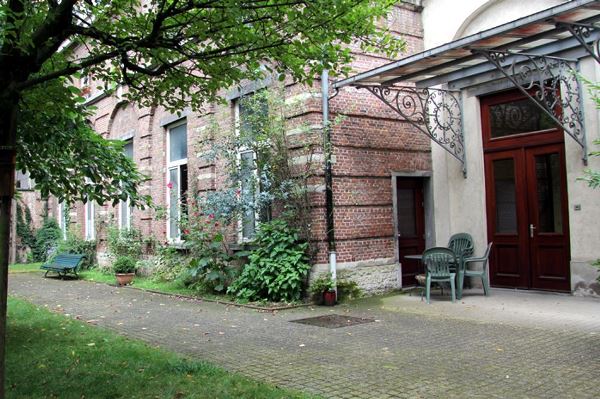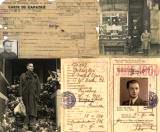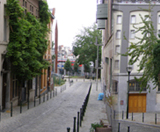Summary, abstract and full texts n° 107
Dossier: L’Aveu [Avowal]
Coordinated by Béatrice Fleury
Béatrice Fleury: Questionner l’aveu (pdf) [Questioning confession]
I. The origins and foundations of a concept
Emmanuelle Danblon: Une rhétorique de l'aveu. Effets d'évidence et effets de sens (pdf)[A rhetoric of confession: the effects of evidence and the effects of the senses]
- The goal of this article is to examine one of the great questions of rhetoric, by means of a study of avowal. Is it possible to establish a link between the validity of an argument and the persuasive force of the spoken word? If an avowal cannot fulfil the function of an argument, where does its persuasive power reside? And finally, how does an avowal as an act of language appear more "evident" than an argument constructed by the orator? By means of a pragmatic and rhetorical enquiry, illustrated finally by the use of avowal in the gacaca courts in Rwanda, we try to take account of the technical link which is established between technical evidence and extra-technical evidence, between truth and persuasion.
Christian Biet: Droit et littérature sous l'Ancien Régime. Le cas de l'aveu, preuve notoire (pdf) [Law and literature in pre-revolutionary France: the case of confession as irrefutable proof]
- Like judicial phenomena, legal methods do not exist as such, and their effectiveness is only apparent because they are formally constructed and contractually recognized by all parties at a given moment in history. Proof in law is therefore only proof because it forms part of the phenomena which are historically empowered by the law, morality, common sense, politics, etc. to produce judicial or legal truth regarding a case. And like any other proof, and like any other legal (and judicial) phenomenon and method, avowal is no exception to the rule. However, in this context, avowal had a predominant place in the law of the ancien régime, as it does in contemporary law. But no matter how predominant avowal may be, it offers only one version of the judicial truth at a given moment in the case. It represents one judicial truth, in other words one possible version of the truth subject to judgment, in that this avowal has been obtained as a result of particular procedures. This is the question in which literature took an interest: starting from considerations of law, in fact, literature gives itself some leeway, distances itself, in relation to legal proof, and examines it at another level, doubts its probative nature or dreads its mechanical and public application. This is why literature sees limits which the law should not cross and recounts the silences it must accept. In Madame de Lafayette’s novel The Princess of Clèves, Madame de Clèves’ avowal, so probative and so fit to condemn her to a process of public punishment, remains secret, judged by her husband and assumed by the guilty woman within the limits of intimacy, and becomes a terrible and much more violent private punishment. For readers it gives rise to an examination dealing not only with that particular avowal, but with avowal as such and in all circumstances, as manifest and sufficient proof in the eyes of the law and those of private consciences. Literature, which thus makes use of the legal and judicial method of proof by avowal, continues at the same time to analyze it, displace it, surround it by its other aspects – those of conscience, intimacy or special interest – to take hold of its weaknesses and provoke debate on the tangible signs of proof and on proof itself, in other words the beliefs which determine it.
II. From confession to its staging
Ophir Levy: La forteresse et l'aveu. À propos d'Un Vivant qui passe de Claude Lanzmann (pdf)[The fortress and confession: concerning Claude Lanzmann’s film A Visitor from the Living]
- In his 1997 documentary A Visitor from the Living, Claude Lanzmann confronts the mass denial of Maurice Rossel, the Red Cross delegate who visited the camp of Terezín in June 1944. Rossel was completely deceived by the Nazi masquerade which consisted of disguising the horror of the camp behind a decor hastily constructed in view of the inspection. The film shows the figure of the witness in crisis and, more radically, challenges the notion of visibility itself, which ceases to be a manifestation of reality but the perverted place of its dissimulation.
Delphine Robic-Diaz: Quand le cinéma français passe aux aveux. Les guerres de décolonisation entre indicible et inmontrable (pdf) [When French films start to confess: the unspeakable and unshowable aspects of the decolonization wars]
- Since decolonization, French cinema has been regularly confronted with the spectacle of its guilt, through depictions of the exactions committed and of the defeat. Over the years the film subject of avowal has thus become as much the expression of guilt as of a desire to acknowledge the traumatism suffered by the French combatants.
Alpha Ousmane Barry: Les aveux de comploteurs en Guinée : mise en scène et mensonge historique (pdf) [The confessions of the Guinea plotters: staging and historical falsehood]
- A quarter of a century after the death of Sékou Touré, Guinea finds it difficult to assume its past. This failing memory prevents it from putting together the scattered fragments of its history. There is a gap between the official memory propagated by the totalitarian regime and the historical reality. In this conflict between memory as a need and memory as a duty, the archives, which I replace in the context of the procedure for extorting confessions, form my main source of information. In this contribution we propose to examine how the contents of depositions, the way in which they are presented and the scenarios at work in the textual framework reveal the designated figure of the guilty party on the basis of a collection of ill-assorted facts and events.
III. Confession and memorial tensions
Béatrice Fleury : Quand la presse française s'empare du passé de Günter Grass (2006-2007). Des dits de l'autre aux dits de soi (pdf) [The French press treatment in 2006-2007 of Günther Grass’s Nazi past: from the words of others to one’s own words]
- An analysis of the comments on the French press on Günter Grass’s avowal of his past in the Waffen-SS gives rise to many surprises. The initial shock was followed by an effort at contextualization which shifted consideration towards memory, both individual and collective. Thus the contexts in which Günter Grass’s past was examined were rooted in the ties which had developed between the writer and some French intellectuals.
Joanna Teklik : L’affaire Popieluszko ou l'histoire d'un aveu politique singulier (pdf) [The murder of Fr. Popieluszko, or the story of an unusual political confession]
- Wieczyński’s film Popieluszko: freedom is within us, released in Polish cinemas in 2009, recalled the murdered priest who became one of the symbols of Polish resistance to the soviet regime. After being kidnapped and tortured, Fr. Popieluszko was killed on 19 October 1984 by three members of the security services controlled by the Ministry of the Interior. "Alive he was a nuisance, dead he was a hindrance": his tomb soon became a place of pilgrimage and public opinion demanded his immediate canonization. Faced with this reaction, the authorities, who were embarrassed (for various reasons), staged a completely pre-arranged trial which revealed both internal dissensions in the Party and the cohesion and strength of the Church. It should be noted that the trial of Fr. Popieluszko’s murderers, initially conceived to demonstrate national consensus, turned into a demonstration of the radical impossibility of consensus. In the end the avowal which was the centerpiece of the trial was nothing but a false avowal, still "controlled" by the ruling authorities, a sort of fiction aimed at protecting those who were really responsible. It need not be added that although the murderers were condemned and imprisoned, they subsequently benefited from substantial remissions of their sentences. The release of the film, some recent publications and the question of the future beatification of Fr. Jerzy have put the Popieluszko affair back in the newspapers, and recall not only the Polish martyr, but also the story of a trial which was unique in the annals of the soviet bloc countries, and that of an unusual political avowal.
Other subjects
Sabina Frontera : « Un espace de liberté ». Les internés militaires italiens à Wietzendorf (pdf) ["A space of freedom": the Italian soldiers interned at Wietzendorf]
- After Italy’s withdrawal from the war on 8 September 1943, the Germans disarmed over 800,000 Italian soldiers. They were asked to choose between continuing to fight beside the Axis or become prisoners. The majority chose detention in Germany. However, the birth of the Social Republic (known as the Republic of Salò) made the presence of "Italian prisoners" in the Reich politically complicated, which is why the Reich, in agreement with Salò, decided to call them "military internees". This was a fortunate choice for the Reich, which thus succeeded in getting round the requirements of the 1929 Geneva Convention by avoiding the control of international organisms, including the Red Cross. Oflag ’83 at Wietzendorf was one of the camps for Italian military internees (IMI). Structurally there was little to distinguish it from the other Oflags and Stalags. Dilapidated, over-crowded barracks offering no protection against the severe winters, primitive sanitary facilities, non-existent health care. A "normal" camp that was exceptional in its sustained experience of resistance, which went beyond the rejection of the war, the world of the concentration camps and the regimes of those who had desired and created them. The prisoners of Wietzendorf engaged in a profound reflection on the past, on the fascist era (the Ventennio or 20 years) and its sense, and on the Italy which the IMI would have liked to build when they returned home. They struggled every day to maintain a small space for freedom in the lager, learn to examine the reality of the camps and the ideologies which had generated them with a critical eye, and to imagine the Italy of tomorrow.
- This article presents the results of research conducted in Wroclaw in 2006 under the sponsorship of the Fritz-Stern Scholarship. These results formed the basis for a Master of Arts thesis defended in 2007 in the department of Cultural Studies at the Europa – Universität in Frankfurt (Oder), Germany. The aim of the research was to analyze the factors that influenced Jews to either emigrate from Poland or assimilate into Polish culture between 1945 and 1968.
Some of our projects
Contact
Auschwitz Foundation – Remembrance of Auschwitz
Rue aux Laines 17 box 50 – B-1000 Brussels +32 (0)2 512 79 98
+32 (0)2 512 79 98 info@auschwitz.be
info@auschwitz.be
BCE/KBO Auschwitz Foundation: 0876787354
BCE/KBO Remembrance of Auschwitz: 0420667323
Office open from Monday to Friday 9:30am to 4:30pm.
Visit only by appointment.
![]()
![]()
![]()
![]()
![]()
Become a member
To become a member of Remembrance of Auschwitz ASBL, please contact us and transfer the sum of €50.00 to our account IBAN: BE55 3100 7805 1744 – BIC: BBRUBEBB with the communication: ‘Membership fee 2025’. The membership includes two issues of 2025 of our scientific journal.
DONATIONS
Donations of €40.00 or more (in one or more instalments) qualify for tax exemption for Belgian taxpayers.
In communication, please specify that it is a ‘Donation’ and mention your National Number which is required since 2024 to benefit from the tax exemption.
Subscribe
Error : Please select some lists in your AcyMailing module configuration for the field "Automatically subscribe to" and make sure the selected lists are enabled










 The Auschwitz Foundation was founded in 1980 by Paul Halter, an Auschwitz survivor. Replacing the Amicale Belge des Ex-Prisonniers politiques d’Auschwitz-Birkenau Camps et Prisons de Silésie, the primary objective of the Auschwitz Foundation is to study the history and memory of the victims of the Holocaust and the Nazi terror in a sustainable and systematic way. The transmission of memory and the preservation of archives concerning these events complete this goal.
The Auschwitz Foundation was founded in 1980 by Paul Halter, an Auschwitz survivor. Replacing the Amicale Belge des Ex-Prisonniers politiques d’Auschwitz-Birkenau Camps et Prisons de Silésie, the primary objective of the Auschwitz Foundation is to study the history and memory of the victims of the Holocaust and the Nazi terror in a sustainable and systematic way. The transmission of memory and the preservation of archives concerning these events complete this goal.





